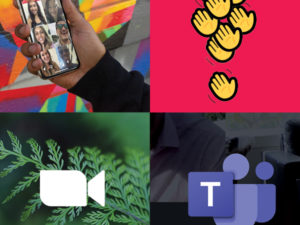The right to be forgotten
A report released by the London School of Economics revealed that young people want to see their digital footprints erased at 18 years of age. Anjela Webster, Netsafe’s education advisor, shares her thoughts on what this could look like.
If you’re like me, you’re probably very grateful your youth didn’t play out online. It was stressful and angst-ridden enough living life offline! I’m relieved there’s no evidence of the pranks, scallywag activities, and broken hearts that partnered those years, as I was forging a sense of who I was, where I fitted in, and, as I navigated the perceived opportunities and risks that presented in my life.
As a 14-year-old, I thought nothing of getting on my Healing ten-speed bike I’d saved for a year to buy and taking off for hours riding ‘miles’ to meet the ‘love interest of my life’ atop the water tank in a cemetery. Innocent hand-holding, basking in the warmth of the concrete top, talking about rock bands and movies and dreams of life after high school.
My parents expected me to be safe and turn up for jobs and dinner.
Meet-ups with friends were made during the school day, or by phone which was situated in the centre of the house where everyone could listen in. There were no computers, few TV channels, even cameras and the development of images were expensive, so ‘capturing’ life was limited. Looking back, life felt simpler and lived more ‘in the moment’. Whatever the trajectory of our youth, it didn’t seem to ‘stick’ when we left school and ventured out into the adult world.
In my role as Netsafe’s education advisor, I hear a lot of concern about how young people are living ‘online’.
I think it’s important to pause and think about the tough environment they’re growing up in. It’s not easy for our young people to be moving through those years in which their bodies are changing, their emotions fluctuate, identity is being explored and forged, friendships rise and fall, relationships develop – when every detail can be captured, curated, shared, and played out online or via digital devices.
To ‘fit in’ and belong, those driving forces within youth and children from as young as nine years of age as identity development kicks in, sees the strong pull to be ‘online’ where their friends and those who affirm them are. However, the internet never forgets.
We most likely all made mistakes, had awkward moments, took risks and did things we weren’t so proud of later. It’s only in those times when we tell our stories that we call on these memories. Their impact may have impacted or shaped aspects of our lives but they can’t be shown and shared again and again and again, having potentially long-term impact on the rest of our lives, with little or no control.
Most young people will make mistakes. They’ll let someone down at some point. They’ll say yes to something they shouldn’t have. They’ll struggle with something at some point in this transition to adulthood. It’s normal. If the internet could only ‘forget’ when we’ve moved on, ‘grown up’ some more, changed our thinking, our values, our behaviours, our lives.
Sonia Livingstone, Professor of Social Psychology at the London School of Economics, and her team are pressing government and stakeholders to act, in the interests of children and young people, to address the ‘right to be forgotten’ and children’s rights online. She states:
“It is imperative to make all stakeholders thoroughly aware that, today, what happens offline will also be manifest online, that what happens online has consequences offline, and that we are witnessing a reconfiguring of risks and opportunities of children’s lives.”
The internet should not be unchallenged. It’s been created by people and is controlled by people. That millions of children and young people across the globe are online, and their needs and vulnerabilities are not considered in the current construct of the internet is not good enough.
“The internet is not the cause of problems in children’s lives in any simple sense. And nor can it provide solutions in and of itself. The internet is created by people, controlled by people, used by people – and it’s they (we) who can change its consequences for our lives.” Sonia Livingstone.
In schools, we’re directing and shaping the learning so that students often need to harness the power of the internet and use digital devices in order to engage in the process, but are we doing enough to support them in the safe, responsible, and ethical use of these same tools and spaces? What are the rights of our tamariki and rangatahi online? What kind of an ‘internet’ do they want? How could we together shape a safer, kinder, more respectful culture online?
While we might not be able to be movers and shakers at a high level of government, we can be mindful of the challenges our children and young people face in world vastly different from the one we grew up in. We can consider ways to better support our tamariki, so their understanding of complexities and potential challenges and risks online grows in accordance with their age and stage. We can talk with them, ask them their thoughts, and draw on their expertise as young people navigating this life at the most vulnerable stages of their being.
In turn, we can provide opportunities for life skills to be learned, along with role-modelling safe and ethical behaviours especially when it comes to safety and security online.







